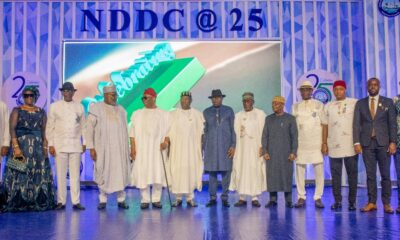Business
The Imperatives Of States Creation
Requests for the creation of more states in Nigeria have been made on many occasions.
There have been requests for the creation of Okura out of Kogi; Aba from Abia; Njaba and Orashi out of Imo; Adada from Enugu State; Toru-Ebe from Delta, Edo and Ondo states; Hadejia out of Jigawa and Katagum from Bauchi State.
Similarly, there have been requests for the creation of Tiga out of Kano State; Karadua and Kafur from Katsina State: Lagoon from Lagos State; Oke-Ogun and Ibadan out of Oyo State; Kwararafa from Taraba and Amana out of Barno. Some people have also solicited the creation of Adamawa, Taraba and Savannah states out of the current Adamawa State; Edu , Gurara, Kainji and Borgu from Niger Apa from Benue, New Delta from Delta and Oduduwa out of Osun, among others.
The requests for states creation became so rampant to such an extent that the former Chairman, House of Representatives’ Committee on Defence, Mr Wole Oke, once announced that the House had received more than 50 requests for the creation of new states.
Observers, therefore, wonder why various ethnic groups across the country have presented a plethora of requests for the creation of more states.
However, some political analysts contend that the sustained campaign for the creation of more states in the country is not because Nigerians have a penchant for promoting divisions of the polity.
Rather, they note that the proponents of new states are only seeking the expansion of the scope and platform for more citizens to express themselves and uti lise their potential under a federal system of government.
Political historians recall that state creation began in Nigeria on May 27, 1967, when the administration of Gen. Yakubu Gowon abolished the regional structure of the country and created 12 States.
They note that the administration of Gen. Murtala Mohammed created additional seven states in 1976, while 11 more states were created by former military President Ibrahim Babangida between 1987 and 1991.
They add that the administration of Gen. Sani Abacha created additional six states in 1996, which brought the current number of states to 36.
Observers, nonetheless, note that the existing states were all decreed into existence by military governments without consideration for the citizens’ consent, as stipulated in the constitution.
They recall that although former President Shehu Shagari initiated a move for the creation of 30 additional states through the machinery of the National Assembly; the move was scuttled, following the 1983 military intervention.
All the same, some cynics have, on several occasions, queried the wisdom in making requests for more states at this point in time.
In spite of such view-points, the Senate announced in 2010 that it would set up a sub-committee within its Constitution Review Committee to specifically consider various requests for the creation of more states across the country.
The Senate has assured the public that the proposed sub-committee would consider the requests and make recommendations.
Besides, the House of Representatives recently said that it had collated the views of Nigerians on the proposed constitution’s review across the country, stressing that states creation was one of the salient themes of the people’s proposals.
Nevertheless, some cynics kick against plans to create more states in Nigeria, stressing that virtually all the existing states depend solely on allocations from the Federation Account for their survival.
They insist that states creation should not be a priority project because every new state will mean an extra burden on the Federation Account, as some of them may not be self-sustaining.
A public analyst, Mr Qudus Lawal, wrote in Daily Post, an online publication, that the quest for states, as contained in the 1958 Willink Commission Report, arose from the concern of minority groups that their interests were not protected in the then Northern, Western and Eastern Regions.
“The report correctly noted that states creation would in fact not be a solution to the fears of minorities, as additional states may not guarantee the creation of another minority group in the new states.
“Some of those craving for new states opined that new states will curb persistent ethnic clashes being experienced in some parts of the country, an example that readily comes to mind is Kaduna South.
“If our aim is to use states creation to settle disputes then, we should be ready to create at least 250 homogenous states.
” My suggestion is that we maintain the present number of states since collapsing them is unlikely, while creating several functional local governments.
” Lawal’s sentiments notwithstanding, a former member of the House of Representatives, Mr Joseph Gumbari, said in a media interview that: “I look at these requests as coming from people who are desirous of development.
“Looking at the history of the creation of states, it has been an exercise that has brought about development; it has also brought government closer to the people.
“From the three regions to the four regions after independence; from the 12-state structure to 19 States and to the present 36-states structure; it is very obvious that development has come to those areas.
“It is expected that some of these people who feel the need for development would always be engaged in demanding for new states.
“We expect that whatever demands that are to be submitted to the National Assembly, all requests will be treated dispassionately, while taking into consideration the realities on ground.
Sharing similar sentiments, the Coordinator of the National Association of State Movements (NASM), Dr Yakubu Ugwolawo, said that states were universal1y accepted as the building blocks of development in a federal system.
“Creation of more states will spread development across the land and help bring the much touted dividends of democracy to the door steps of the average Nigerian; the creation of more states will also create new jobs,” he said.
Ugwolawo said that as part of efforts to convince sceptics on the need for more states creation, NASM, in collaboration with the Coalition for Responsive Governance, would organise a seminar on May 27 to stimulate public understanding of the advantages of having more states.
Ugwolawo stressed that the creation of more states in the country would ensure more rapid and even development of rural and urban areas, while enhancing the citizens’ living standards.
He noted that many Nigerians wanted the creation of new states to satisfy their political and development aspirations, calling on the National Assembly not to fail them in that regard.
All in all, analysts urge the National Assembly’s committees on state creation to evaluate all the requests for the creation of more states and make positive recommendations on those that meet the constitutional requirements.
They say this will enhance the citizens’ confidence in the legislature and boost democratic governance.
Olaitan writes for NAN.
Business
NCDMB, Dangote Refinery Unveil JTC On Deepening Local Content

Business
Industry Leaders Defend Local Content, … Rally Behind NCDMB

Business
Replace Nipa Palms With Mangroove In Ogoni, Group Urges FG, HYPREP

-

 Rivers1 day ago
Rivers1 day agoNDDC Inaugurates Ultra-Modern Market In Rivers Community
-
Opinion2 days ago
Why Reduce Cut-Off Mark for C.O.E ?
-
News1 day ago
Nigeria’s Inflation Rate Dropped To 22.22% In June -NBS
-
Niger Delta1 day ago
Adopt African System Against Crime, Don Urges Security Agencies
-
Politics1 day ago
2027: Group Vows To Prevail On Diri To Dump PDP For APC
-

 Features1 day ago
Features1 day ago25 Years After: NDDC Celebrates Milestones Of Impactful Development
-
Politics2 days ago
Atiku’s Exit No Problem To PDP – Makinde
-

 News1 day ago
News1 day agoRivers Police Arrest Notorious Cultist, Recover Sophisticated Ammunition

